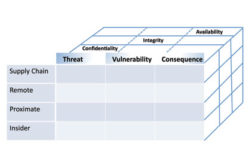Cyber Tactics Column
The FTC has become the nation’s leading force to drive and enforce consumer privacy
Read More
Stopping Cybersecurity Breaches Means Rethinking Consequences
Would there be a greater return on investment if our information sharing focused less on enabling private sector victims to better duck and cover, and focused more on enabling the government to get the bad guys?
May 1, 2014
Using NIST for Easier Cybersecurity Management
Corporate executives can develop enough expertise to comfortably navigate key cybersecurity risk management concepts
April 1, 2014
Why Cybersecurity is a Business Necessity
For well over a decade, CEOs have been relegating the operational, legal, reputational and competitive risks associated with cybersecurity to those responsible for Information Technology.
March 1, 2014
Why You Need Cybersecurity Risk Management
Governments and corporations are facing considerable risk to their data
February 1, 2014
How to Reduce the Insider Cyber Threat
To best protect your company against internal abuse, it is helpful to understand the nature of the threat and to consider applying risk-based approaches to address the problem.
January 6, 2014
What to Expect When Working with Cyber Cops
What your company, as a victim of a computer intrusion, should expect when working with the Feds.
December 1, 2013
Top 5 Reasons to Report Computer Intrusions to Law Enforcement
Even when not legally required, reporting cyber crime to law enforcement can act as a deterrent for other malicious actors contemplating future attacks.
November 5, 2013
What Has Been Accomplished on Cyber Legislation?
In response to the growing cyber threat, Congress has been busy drafting legislation.
October 1, 2013
What is the Most Influential Cyber Security Team?
The Information Technology Laboratory at the National Institute of Standards and Technology is leading the charge for cyber security.
September 1, 2013
Sign-up to receive top management & result-driven techniques in the industry.
Join over 20,000+ industry leaders who receive our premium content.
SIGN UP TODAY!Copyright ©2024. All Rights Reserved BNP Media.
Design, CMS, Hosting & Web Development :: ePublishing










